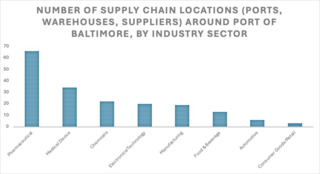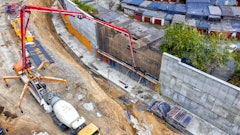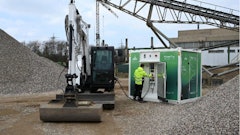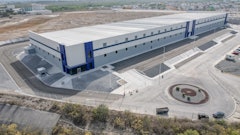
In the wee hours of March 26, a large container ship lost power and struck the Francis Scott Key Bridge, forcing the bridge to collapse and killing 6-plus people.
While the full extent of the impact is yet to be determined, the collision is likely to have far-reaching consequences for the Port of Baltimore and its role in the regional and national economy.
“The bridge collapse will cause substantial supply chain issues along the U.S. East Coast for American importers and exporters, as ships will not be able to reach container and other terminals in the Port of Baltimore to unload or load import and export cargo,” says Mirko Woitzik, global director of intelligence for Everstream Analytics. “The Port of Baltimore is one of the 10 largest ports in the U.S. in terms of dollar value of cargo handled, and a critical hub for steel, aluminum, sugar, vehicles, agricultural equipment and containers. There are about 30-40 container vessels calling the Port of Baltimore every week, unloading or loading some 21,000 TEU (containers) which now have to be diverted to other nearby ports and unload/load cargo. This will disrupt vessel schedules and strain labor and handling capacities at other ports such as Philadelphia and Norfolk, leading to spill-over congestion and delays that could last months.”
 Everstream Analytics
Everstream Analytics
DALI, the cargo ship, was operated by Synergy Group and time-chartered by Maersk.
While the magnitude of the impact is yet to be determined, the disruption in traffic and operations at the port could lead to significant economic losses, according to Container xChange. The port generates nearly $3.3 billion in total personal income and supports over 15,000 direct jobs, with an additional 139,000 jobs connected to port work.
“As we navigate the aftermath, we are reminded that the container logistics industry centers around the critical need for robust risk management and resilience in supply chain operations. It highlights the importance of contingency planning, diversified routing options, and the integration of real-time tracking and analytics to mitigate the impacts of unforeseen events. This incident serves as a reminder that infrastructure vulnerabilities can lead to disruptions, and being prepared with flexible, adaptive strategies is essential for maintaining continuity in the face of challenges,” says Christian Roeloffs, co-founder and CEO of Container xChange.
Key takeaways:
- The collapse of the Francis Scott Key Bridge could significantly disrupt the flow of goods in and out of the Port of Baltimore, particularly automobiles and crude oil.
- Companies should prepare to face higher transportation costs as they are forced to seek alternative routes to bypass the affected area, according to Container xChange. These additional costs could result in increased prices for goods, impacting both businesses and consumers.
- The disruption caused by the bridge collapse could have a ripple effect on the local economy, leading to job losses, reduced business activity, and potentially lower consumer spending.
- Products that rely on timely delivery, such as perishable goods or time-sensitive materials, could be particularly affected.




























